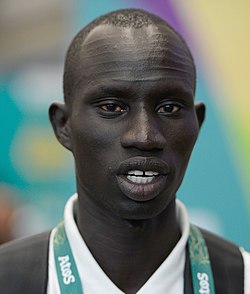 Chiengjiek at the 2016 Olympics | |
| Personal information | |
|---|---|
| Born | March 2, 1992 Bentiu, Sudan (now South Sudan) |
| Height | 1.79 m (5 ft 10+1⁄2 in) |
| Weight | 59 kg (130 lb) |
| Sport | |
| Country | Refugee Olympic Team |
| Sport | Track and field |
Event | 400 metres |
| Club | Tegla Loroupe Foundation [1] |
| Coached by | Tegla Loroupe [1] |
| Achievements and titles | |
| Personal best | 52.89 (2016) [2] |
James Nyang Chiengjiek (born March 2, 1992) is a runner originally from South Sudan, but now living and training in Kenya. He was selected by the International Olympic Committee (IOC) to compete for the Refugee Olympic Team (ROT) at the 2016 Summer Olympics. [3] He placed last in his 400 m heat. [4] He also qualified for the 2020 Tokyo Olympics ROT, and placed last in his 800 m heat after tripping due to a fellow competitor's involuntary touch.